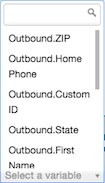Manage script properties
Scripts have global settings that affect how you can use a script.
- Click Admin.
- Under Contact Center, click Scripts.
- Click the name of a script.
- On the toolbar, click Script and then Script Properties.
- Edit the script properties as appropriate.
Enabling this property allows the script to read columns from a contact list for use in variables and contact form components. To use a script for a campaign, you must edit the campaign and choose the script.
- Contact list associates a contact list with the script. This association allows the script to read the columns in the contact list, which in turn allows you to use those columns as variables.
- Contact data load action specifies the action that runs after the contact list loads at runtime.
Result of enabling a script’s outbound contact list setting
| A Contact List Form icon appears in the component toolbar. Click the icon to insert a vertical list of controls that correspond to each column in the selected contact list table. For more information, see Contact list form. | |
 |
When you click Select Variable to bind a component (such as a text box) to a variable, the list of variables contains contact list columns and any custom variables you manually defined. The variables have an Outbound prefix. For example: By binding a component to a contact column variable, you can create forms that update the contact list with information that the agent collects or updates. |
Use caution when assigning a different contact list to a script
Once a contact list is assigned to a script, you can display run-time values of contact columns in the script by enclosing variable names in braces. For example, a script might display the first name of each outbound contact, if a text component contains the name of a contact column variable:
Hello {{Outbound.First Name}},
In preview mode, the variable name appears in square braces, since no data is read from a contact list in preview mode:
Hello [Outbound.First Name]
If you use contact column variables, be careful when you change the contact list that is assigned to the script. If the new contact list does not contain columns with the same names, the script cannot display values. If preview mode shows a variable name in curly braces instead of square braces, then the variable is not accessible and you may need to change the variable name to match a column in the assigned contact list. Curly braces are always displayed in edit mode, however.
Enabling the Inbound property for a script allows Architect call flows to select it. Any call flow can invoke the script to screen pop an interaction. However, if an Architect call flow must pass information to the script, variables in the script must have the same data type as variables in the call flow.
When Architect passes control to the script, the system assigns values of variables in the call flow to the corresponding script variables. The assignment happens before screen pop occurs. Setting up this process requires the script designer and the call flow designer to exchange information about the variables.
Enabling a script’s Callback property allows Create Callback actions in Architect call flows to select the script.
Enabling the Chat property allows you to use scripts with web chat interactions. The Chat property gives the script access to variables passed in through web chat. Such variables include the room ID and customer name if you have configured web chat to ask for the customer’s name.
Set a queue’s default script for chat interactions so that agents can use the script during web chat interactions.
Enabling the Email property allows you to use scripts with email interactions. The Email property gives the script access to variables for the customer’s email address and the email subject.
Set a queue’s default script for email interactions so that agents can use the script during email interactions.
Enabling the Message property allows you to use scripts with message interactions. The Message property gives the script access to the message type variable.
Set a queue’s default script for message interactions so that agents can use the script during message interactions.
Scripts can query data from any data source for which a data action or bridge action is available. Any scripting component that supports actions can use Data Actions.Execute Data Action to pass necessary inputs to an external interface and then optionally receive data returned in output variables. For more information about Data Actions, see Enable a script to use external data.
User to User Information (UUI) is exchanging or passing data that is unrelated to the call from one application to another. Scripts support UUI data exchange, and store UUI data in the UUI.UUIData variable. Scripts can also update UUI data with the UUI.Update action. To use UUI data, enable the User to User Information settings on your trunks.
Scripts can query and update customer secured data that is stored and encrypted in the Genesys Cloud platform by a customer key. Enabling this script property allows administrators to query and update customer secured data. For more information see, Use an AWS KMS symmetric key for conversations.
List variables are turned on automatically.
Scripts can use advanced actions on lists to work with and update list variables.

